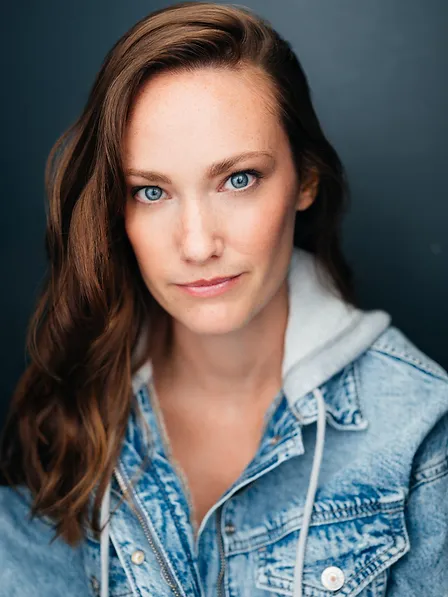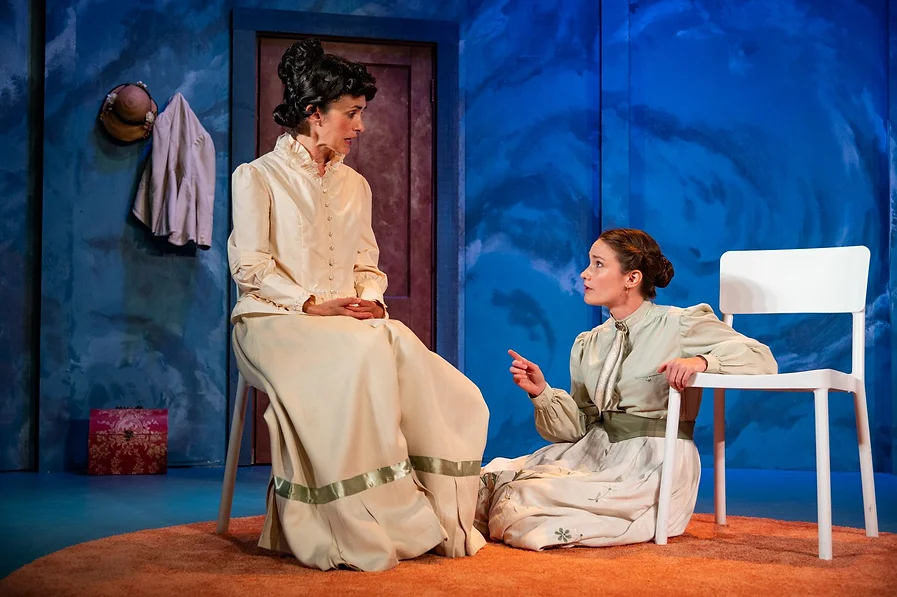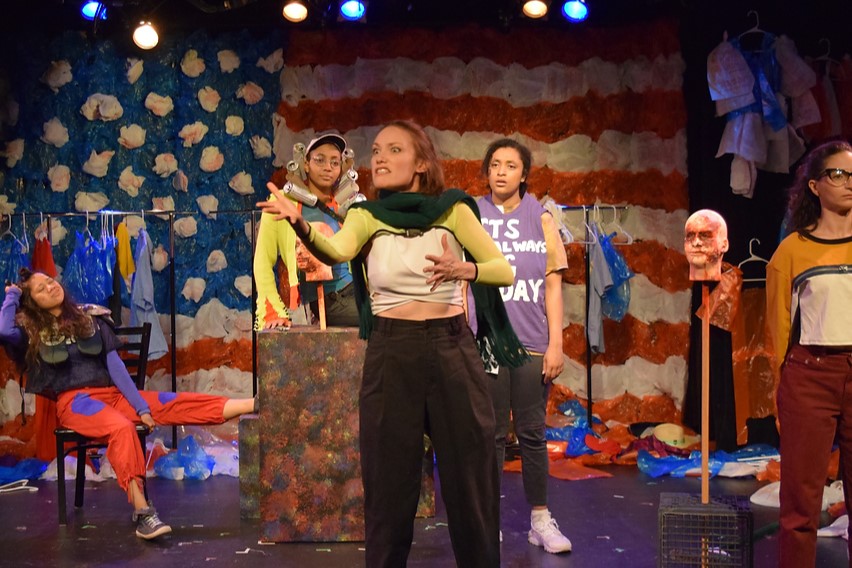BY MAX MCGUIRE ’24

Laura Menzie, visiting professor of acting here at Skidmore, wears many hats. She considers herself an actor, for both stage and screen, a theater teacher and coach, a storyteller, and a meatball enthusiast (which I couldn’t agree more with). In early November, after months of correspondence, I got the honor of meeting with Professor Menzie to discuss their acting journey, and what drew them to teaching for the performing arts. The following is a redacted transcript of the conversation:
Max: Thank you for agreeing to meet with me, Professor Menzie! To begin, tell me a little bit about yourself. How did you first get involved in the performing arts world? What drew you to Theater?
Menzie: I was one of those kids who loved performing, and loved putting on plays, and writing plays, like, nonsensical plays for my grandma; I followed that passion right on through. I was really involved in high school, particularly in my high school theater club which I was president of, and to be honest, it was the thing that kept me in school. It kept me focused, because I definitely struggled in school with attention span, and finding my place. The theater was always an anchor for me. And then I went to Clark University- do you know it?
Max: Yes, I have some friends from high school who ended up going there.
Menzie: I see so many similarities between Skidmore and Clark. My original plan was to go there for Psychology. Then I found out science wasn’t my thing, so I didn’t want to do that anymore. I took an intro to acting class, and that was sort of that. Similarly, I struggled a bit in college with not knowing what I wanted to do and feeling distracted. I’m a very sensitive person, as I know lots of theater people are. The Theater Department was, again, the thing that was my anchor. I had a teacher, Angela Brazil, who is now the head of the Brown MFA program, and a company member with Trinity Rep in Providence. She said, you know, you could really do this. I was a first-year acting student, and it was one of the most impactful moments I’ve ever had. Theater, and the friends that I’ve made in theater, and my love for theater, have been the guiding light.

Max: Would you say that Angela Brazil really inspired you to be courageous with acting, and with theater in general?
(It should be noted, on Menzie’s website, she says, “I believe wholeheartedly that the world is made better by the courage of artists, and I am proud to be a part of that”).
Menzie: Yes! Absolutely. They inspired me to be courageous. I remember my final scene for that class was a scene from Proof, the classic scene study scene. I was so into it that I grabbed the notebook, and I accidentally ripped it, and the pages went everywhere, but it was that full commitment, you know, that fully going for it. Because, you know, I was-and still am-scared, all the time. Starting a new position here, not knowing anyone (except for Professor Dennis Schebetta), not knowing the community; it’s scary putting yourself out there. It’s scary getting on stage and auditioning in front of a group of people that you don’t know who are essentially “judging” you. So, Angela Brazil definitely gave me the courage to do all of that.
Max: Is there a favorite project you’ve worked on (in theater?) Which, I recognize, is such a nuanced question because I’m sure every single project you’ve worked on holds a special place in your heart.
Menzie: For different reasons, right? I’m especially thinking about things that have gotten the most response, like I did a movie a few years back with Shawn Michaels or “The Heartbreak Kid” – so like this wrestler guy- called 90 Feet From Home. Those projects are the ones people have been the most impressed by because people think of TV and movies as being closer to “making it” than doing cool fringe theater in the city. But, I did a touring production of Brilliant Traces that I was really proud of because there was fight choreography, there were high emotional peaks and valleys. Also, Tartuffe, because you never think you’re going to get that opportunity to play Tartuffe in Tartuffe. It was an all-female cast. I was very proud of that, and it was interesting too, playing a role that is written for a cis-gender man, and the permission it gave me to do certain things. I was bizarrely performing femininity in so many of the roles that I was playing. When I was playing Ophelia in Hamlet, or Juliet in Romeo and Juliet, not only was I acting the part, but I was also playing this idea of what an ingénue is. And that was stifling in a way I didn’t even realize until I had the opportunity to play Tartuffe. I was like oh, I don’t need to play this the way it’s always been done before.
Max: What is some advice you have for students who want to go into acting?
Menzie: This is sort of a cop out, but the advice is: don’t listen to advice. Use yourself as your best guide, because as soon as I graduated, I did so many casting classes and acting classes, trying to get into the industry, which is good and helpful and important for someone who wants to act professionally, but you also get all of this contradicting advice. People will say you HAVE to be in New York or Los Angeles, or it’s better to stay in a smaller market and build up roles and build your resume. People will say try to get equity as fast as you can while also saying absolutely DO NOT go equity!
Max: Everyone has an opinion.
Menzie: Everyone has an opinion! Remember the thing that you love and go after that. Remember the thing that makes you excited about being in the theater and focus your energy there, even if it’s not necessarily the best thing to do financially. That’s where the energy is- you get a group of friends together, and you all read a play that you like. Networking and all that stuff is important, but I think it’s more important to be connected to the thing you love most about theater; let that be your guide.
Max: Your advice is something I resonate with, because if you hate what you do, at the end of the day, why are you doing it? You should be doing the things that you love.
Menzie: Nobody goes into Theater to make money. Yes, you have to pay your bills, and yes, sometimes you have to take jobs you’re not super excited about, but if you lose that connection to why you love theater, then you’re wasting your time. In one of her advice columns, Cheryl Strayed says “you don’t have a career. You have a life”, which really resonates with me. That career is a part of your life. I can’t separate now I’m going to do career and now I’m going to do life.
Max: It’s all life.
Menzie: It has to be feeding you in some way. You do what you have to do, but you have to keep that spark alive.

Max: Can you speak to the differences in working for live theater versus film? I know you said that people think working for film is “making it” over fringe theater, but in your honest opinion, what are the pros and cons of working for either industry?
Menzie: I think that both are useful, but I also think that if you’re all about theater, that doesn’t mean you should turn down any film experiences that may come your way. Similarly, I know people in the city who are all about film and TV, and they don’t have a theater background at all, but they find that every once in a while, doing a play is really helpful for them. I think doing both is good! I had a casting director say “Acting is acting is acting” whether it’s theater or film. I do truly believe that. The core acting training can help you do both, and then the rest is technique. I think theater is much kinder to actors because you have an ensemble and that sense of community. You get to rehearse and build something together, whereas, in film, you do your work, you show up on set, you may share a falafel with your scene partner, and then you do your scene and go home. Sometimes, your scene partner isn’t there, and then you’re talking to the tennis ball on a stick. I encourage students to do both live theater and film, but there are A LOT of differences and sometimes, those differences can be jarring. I will say, though, the upside of working in front of the camera is, sure, the fact that you can do multiple takes, but also you can do wildly different things in each take. You get to play a lot more.
Max: What made you want to teach in the performing arts world?
Menzie: Part of it was the experience I had at Clark University. The experience I had in my liberal arts education completely changed the course of my life. I really love acting, and so I really geek out when I’m able to help other people get closer to that. There is something really nice about having that energy go outwards, and feeling like you’re hopefully helping somebody else instead of just doing your own thing. I know that artists help people with their work, but teaching feels way more direct. You know, if somebody comes to you and says I’m not sure how to do this or I have this issue, you can facilitate a space where people feel comfortable trying new things and trying to work out those issues. I definitely don’t feel like a “Sage on the Stage”. I don’t feel like I’m this “beacon of knowledge” where everybody comes and just listens to me. I will share all of my experiences and perspectives, but really what I want to do is create spaces where people feel open, and can work on what they want to work on.

Max: At the end of the day, my motto is I’m always going to be a student, and I’m always going to be learning something new. You learn things by just going out and living your life, just like there’s no separation between a career and a life, there’s no separation between school and life. Would you say it’s the students you meet that inspire you to keep educating?
Menzie: Oh my goodness, yes! What I love about theater, in general, is that it forces you to be brave and full-hearted. That’s how I feel when I interact with students at Skidmore.
Max: My last question- how have you liked Skidmore so far?
Menzie (sarcastically) Oh I’ve hated it! (*insert much laughter here*) No, but seriously, it feels weird to be back in school, but in a different way. When I was in undergrad, and even in grad school, I basically lived in the theater building, which I see people do here. But I love it! As I said, it reminds me of Clark in a very special way.
Max: Professor Menzie, I’m glad we, the students, could make Skidmore an enjoyable experience for you! Thank you so much for agreeing to meet for an interview, thank you for sharing your experiences with me, and thank you for providing those spaces in which students can be themselves and work on their craft in your classes!
Click here to go to Laura Menzie’s Website
***
Max McGuire ’24 is a staff writer for the Skidmore Theater Living Newsletter
